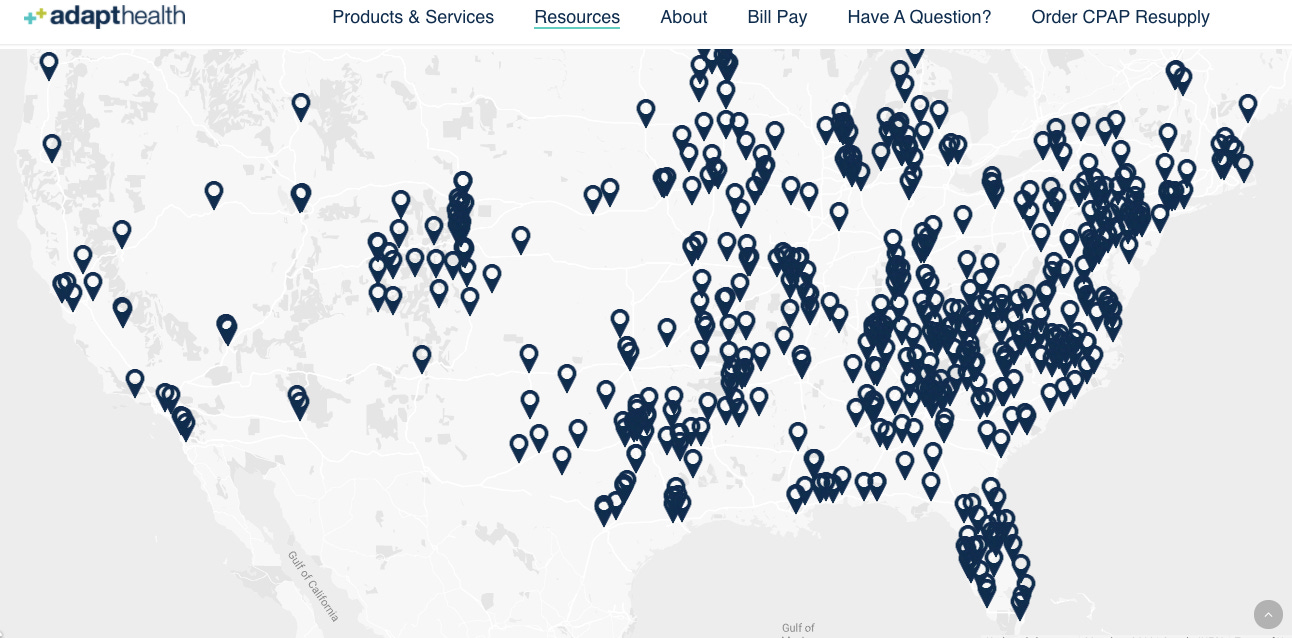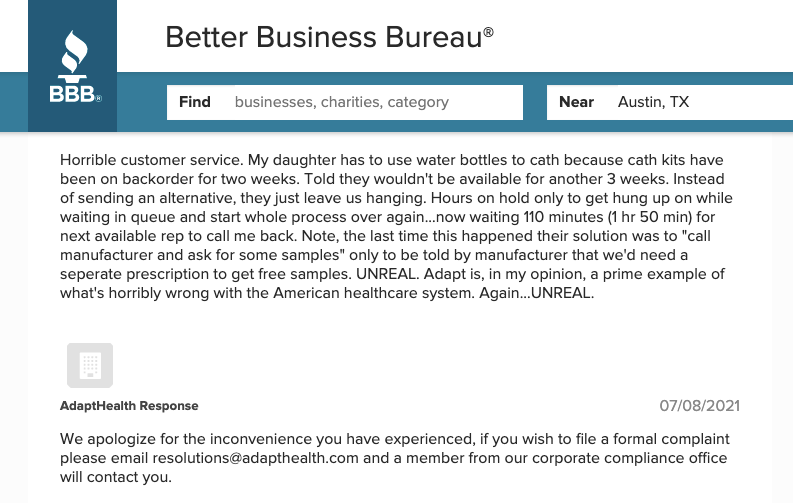Last week, I wrote about Medicare’s Competitive Bidding Program (CBP), an ongoing initiative to reduce DME expenses and weed out fraudsters. As anticipated, this led to sizable cuts in DME reimbursement rates - sometimes cutting rates in half. Arguably unforeseen, this effort has spurred 40% of DME suppliers to leave the market since 2010. CBP also catalyzed a consolidation spree - giving rise to National Seating & Mobility, Apria Healthcare, and AdaptHealth.
Today, I’d like to unpack what this consolidation looks like, starting with a look at AdaptHealth’s rise, a private equity roll up / platform play that went public via SPAC in 2019. Established in 2012, AdaptHealth has fueled its growth largely through acquisitions - 130+ to date. In Q120, Adapt completed its largest acquisition yet with its purchase of Aerocare, a FL-based oxygen conglomerate with 300+ locations in its own right! So, in just 9 short years, Adapt has become the third largest national provider of DME in the country. Let’s unpack that.
Brief Primer: Platform Plays and Roll Ups
AdaptHealth is the result of two mainstay strategies of the PE playbook - the platform play and the roll up. A roll up strategy is fairly straightforward - buy up a number of small and regional players in a fragmented industry, then centralize various functions to achieve economies of scale (procurement negotiations, administrative functions, medical billing, customer service, etc). You’re seeing a lot of publicized rollups in Amazon third party sellers right now.
A platform play is a strategy where a firm buys a number of complementary businesses and uses them together to create business efficiencies. One common form is developing a one-stop shop. Say you have a regional chain of mosquito repellent retailers, a chain of tent retailers, and a trail mix company. If you acquire all three (and a few others? I don’t know I don’t do outdoors), the overarching business becomes THE shop for consumer camping needs. Another method of doing this is through vertical integration. Say you own an urgent care clinic, a medical logistics company and a medical equipment supplier. You could then position your medical logistics company to service your urgent care clinics needs - saving on cost and increasing efficiencies by bringing the supply chain workflow in-house.
History of AdaptHealth
AdaptHealth was started in 2012 in Plymouth, MA - led by CEO Luke McGee and formed out of his employing PE firm Quadrant Management. Luke McGee - 28 (!!!) at the time - had served previously for two years at Quadrant in investing and operating capacity. Prior to that, McGee served a combined six-year stint in investment banking at Merrill Lynch and Deutsche Bank. I guess there is nothing wrong with this - and I am certainly not one to argue for the old guard - but still, something makes me a bit queasy when I think about a 30 year old private equity investor laying off underpaid, older, frontline staff of AdaptHealth’s acquisitions.
Anyways, from 2012-2015, AdaptHealth deployed ~$60M in capital, acquired 18 DME suppliers across 9 states, and earned $175M and $30M in revenue and adjusted EBITDA respectively. Starting in 2016, AdaptHealth began a real acquisition frenzy - with 49 acquisitions across 34 states by 2018, and 59 acquisitions across 49 states by 2019 - that’s 21 acquisitions just between 2018 and 2019.
In an early example of a now prevalent trend, AdaptHealth SPAC'd its way into the public markets in 2019 - using the investment vehicle DFB Healthcare Acquisitions Corp. - sponsored by well-known NY PE firm Deerfield Management. As financial pundits are quick to point out, this is a quicker, less stringent way to get on the public markets (and the access to public funding) than the traditional IPO.
2020 and 2021 have been monumental shake-ups for AdaptHealth, and not just because of the pandemic that has touched all of our lives. Most jarringly, a material number of C-suite execs have left. These departures include the CFO, CTO, CSO (Chief Sales Officer), and the CEO himself Mr. McGee, who was formally indicted by the Denmark government for alleged tax fraud occurring in 2014-2015. Shortly after his forced resignation, Mr. McGee also sold >$20M worth of his stock in AdaptHealth (not a great sign for company confidence).
2020 also saw AdaptHealth’s largest acquisition to date - the 2000 est., FL-based oxygen supply company AeroCare - for $1.1 billion in cash and roughly another billion in AdaptHealth stock. Prior to the completed acquisition, AeroCare served more than 1,000,000 patients a year - rivaling AdaptHealth’s own market reach. This acquisition massively expanded the overall business size and introduced new leadership in the form of current AdaptHealth CEO and founder of AeroCare, Steve Griggs.
In summation, AdaptHealth has acquired 133 DME suppliers headquartered in 35 states - covering wound care, sleep and respiratory therapy, mobility products, ventilation, and nutrition. This does NOT take into account the downstream suppliers that Adapt’s acquisition targets have also acquired. All in, the number of true DME supplier integrations is easily in the hundreds over the last 8 years. When you take this into account, it’s easier to understand how AdaptHealth became the 3rd largest DME provider in the US in such
The Good and Bad of All This
So what does this consolidation mean for patients and suppliers? Well, let’s start with the practical benefits. As I touched on above, the regulatory environment of the 2010s is what made a roll-up strategy like Adapt’s tenable. Many smaller practices simply couldn’t survive (or at least not as insurance-taking practices) with the direction Medicare and commercial rates have been going. Better to be acquired than to go out of business, which is better (even if sometimes marginally) for patient access as well. Further, there are obvious benefits to a centralized billing, customer service, and procurement function, if handled properly.
The bad can be summed up with this default AdaptHealth response to customer complaints:
Note that this clearly “in the right” caregiver is not directed to a customer service representative, but rather a corporate compliance officer. If anything says where AdaptHealth’s priorities lie, it’s that - not patient success but doing just enough to cover their butt.
There is also the question of sustainability. This illuminating, though obviously biased, 2021 short-seller report on AdaptHealth by Jehosphat Research (JR) offers a damning and well-argued case against AHCO (Adapt’s stock ticker) - which I will summarize below (though I recommend the read. In essence, JR arguesAdapt obfuscates its true organic growth under its acquisition growth, which Jehosphat places at double digit negative for the last two quarters. This weak organic growth results from Adapt’s failure to adequately vet its acquisitions, which is seemingly confirmed from JR’s interviews with anonymous former Adapt executives. Thus, a number of Adapt’s acquired businesses have been “rotting” from the inside - a “house of cards”. Adapt’s AeroCare acquisition is the edge of the precipice - for where else is there to go? Adapt can’t acquire any entities big enough to continue to its true (lack of) organic growth.
Again, I highly recommend reading this report - its humorous in a biting sort of way. What’s more, the JR report is pretty convincing, so much so that Adapt is now being sued for securities fraud in a class action lawsuit. The basis for the suit? That Adapt illegally misrepresented its organic growth to shareholders - including retroactively changing organic growth numbers without giving notice or reason as to why those changes occurred. A suit does not imply guilt, and we’ll likely never know either way since these tend to get settled out of court. But the existence of such a lawsuit is nothing to wave away.
So what happens if Jehosphat Research is right about the state of Adapt - over-leveraged and underperforming? What happens to the remaining employees of these acquired DME shops? The people who get their oxygen resupply from Adapt’s companies? I don’t know. And I don’t think AdaptHealth knows either - which is scary given that ~3,000,000 patients rely on Adapt’s family of companies for critical HME.
Thanks for reading! Next time, I’ll put a spotlight on one of AdaptHealth’s largest competitors - Apria Healthcare. Til then! Please share if you like.
Have any stories about your DME experiences? I’d love to hear them! Shoot me a message and I guarantee I’ll respond at ed.manzi55@gmail.com.





